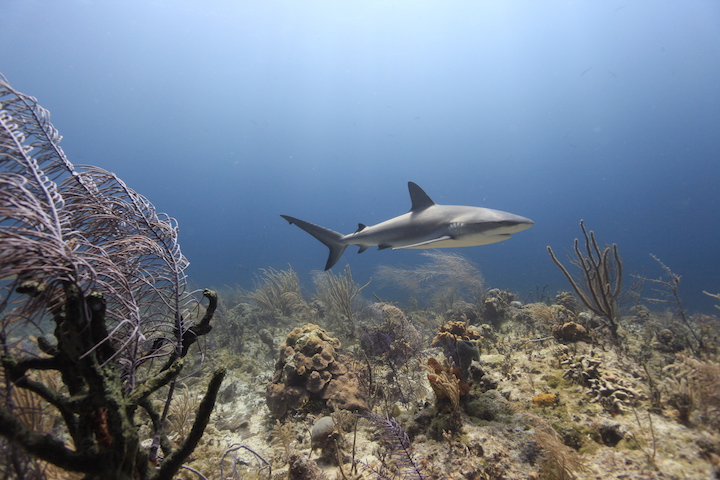
(Pew Photo)
|
A recent
study published in the journal
Biological Conservation has
found that sharks and rays contributed US$114 million to the Bahamian
economy in 2014, with 99 percent of this value generated by the shark
and ray tourism sector. The new research
contributes to a growing recognition that shark conservation provides
significant economic benefits in addition to critical conservation
value.
The
study was spearheaded by Edward Brooks, Ph.D., and led by research
associate Andrea Haas of the Cape Eleuthera Institute,
and assisted by Tony Fedler, Ph.D., of the University of Florida.
According to the study, 19,000 divers—or 43 percent of all dive tourists
visiting The Bahamas—came primarily to see sharks. Recreational shark
divers spent $49 million, which went on to circulate
through the national economy and ultimately contributed $109 million to
The Bahamas.
This is the first study to estimate the full economic impact of shark-related activities in The Bahamas, and it suggests that
the country hosts the world’s largest shark diving economy.
“Although we’ve long understood [that] sharks are important to The Bahamas’ economy, quantifying this was a critical step to
assessing the value of the nation’s conservation measures,” Brooks said.
The
Bahamas has a long history of protecting its shark populations. In the
early 1990s, the country banned longline fishing—a
primary driver of the nonintentional catching of sharks—and in 2011
declared its entire exclusive economic zone a shark sanctuary. That
ended all commercial shark fishing in Bahamian waters and included a ban
on the trade, sale, and possession of sharks and
shark parts.
“The
research results are in keeping with other studies that demonstrate the
high economic value of sharks, including some
showing that sharks are worth more alive than dead,” said Luke Warwick,
director of The Pew Charitable Trusts global shark conservation
campaign. “The study also could catalyze other governments in the region
and globally into action to protect these critically
important species.”
Highly
migratory shark species, including the great hammerhead, tiger, and
oceanic whitetip, are extremely sought after by
divers. These species are protected in The Bahamas but lose that status
as they swim outside of the country’s waters—further highlighting the
importance of international and regional conservation efforts to protect
highly migratory sharks in the Caribbean.
The study was supported by The Pew Charitable Trusts, which works with scientists to inform the organization’s conservation
objectives.
Read the full report here.
Also:
Stingray Feeding Added to Bahamas Sustainable Tourism Product
Bimini students learn about economic value of sharks and rays
